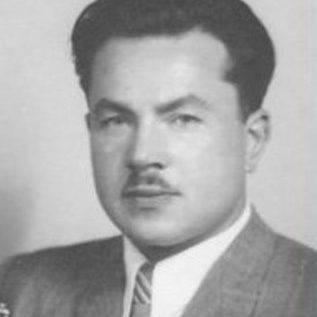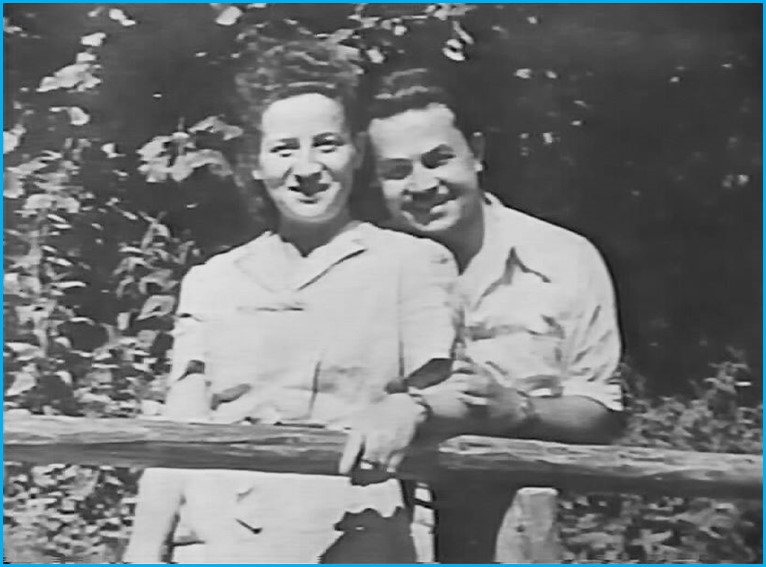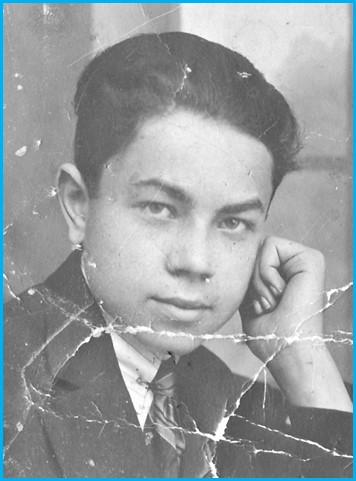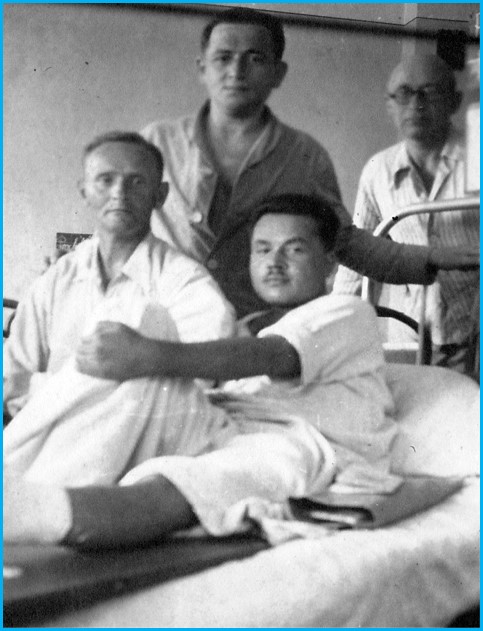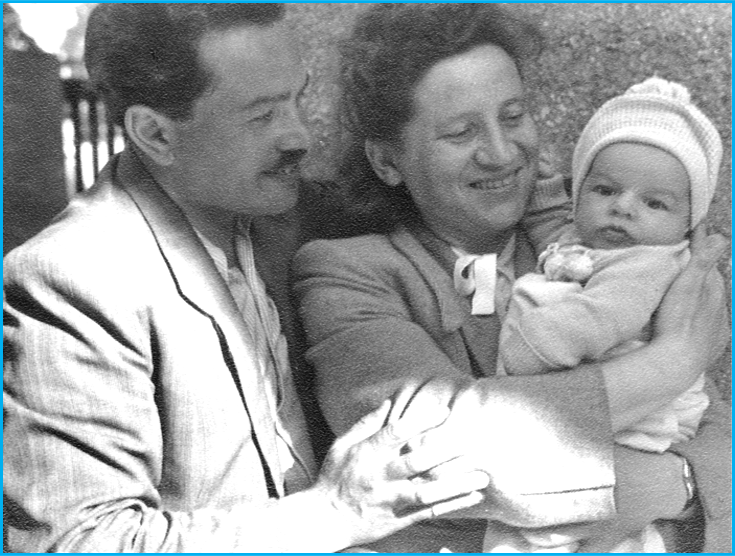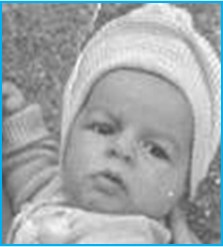PRINCE: Today is October 28, 2003. My name is Vida “Sister” Prince, and I am interviewing Mr. Abe Lowe for the Oral Histories Project for the Holocaust Museum and Learning Center. [tape cuts] Mr. Lowe, we just talked a few minutes ago and I said that what I wanted to know was mainly how you grew up, what life was like, and when you lived in Lodz. And do you pronounce it…?
LOWE: Ghetto.
PRINCE: Ghetto?
LOWE: G-H-E-double T- O.
PRINCE: But, Lodz, do you pronounce it…?
LOWE: Lodz.
PRINCE: Lodz, Lodz, okay.
LOWE: It is a L-O-D-Z, and the Z has a point on the top, is Lodz.
PRINCE: L-O-D-C-Z?
LOWE: Z, a Z.
PRINCE: Yes.
LOWE: And the Z has a point on the top that has a zee.
PRINCE: Okay.
LOWE: Lodz.
PRINCE: Lodz, well, start with telling me… and then you were in the Lodz ghetto.
LOWE: Ghetto, yes.
PRINCE: And deported to, to?
LOWE: Auschwitz and Dachau.
PRINCE: Auschwitz and Dachau, start with when you were born, and who lived in your home, and somewhat about your family life, and your parents?
LOWE: I was born in Lodz, and raised in Lodz. I went to cheder, I went to school. When the World War came, when the Germans occupied Poland, this was the worstest thing in my life.
PRINCE: You were born in 1916, is that correct?
LOWE: 1913.
PRINCE: 1913? Okay. So, well then, tell me about the worst time in your life?
LOWE: The life is very awful . First of all, Lodz was a big town. Three million people. They took Jewish people and they put them in the worstest part of the Lodz, which was _______ broken,you know? And that’s where we have to live, and pay rent, and go to work every day in the morning. And the portions was the worstest thing, we couldn’t get any food.
PRINCE: Any what?
LOWE: Portions, food, food was portioned.
PRINCE: Food.
LOWE: And _____ was no food at all. They gave us a portion that you could not live by it. And this portion, sometimes you have to break and give your own mother and father and sister, cause they haven’t got enough. They’ve been sick, they’ve been broken. And medication was, medical health was no, absolutely nothing. There was no doctors, no nurses, no hospitals. Each can depend on who’s helping us. And that’s why people have been dying very very easily. Whole families died for hunger. That was the worstest thing, and every day we were taken to work, hundreds were laying, laying, the railroads.
PRINCE: Ties?
LOWE: The roads, you know?
PRINCE: Yes.
LOWE: I mean, this is whole _____ heavy. We were broken, hungry, and we have to do it. And they gave us our soup. That was the only thing what they gave us. And a little piece of bread.
PRINCE: Mr. Lowe, what did your father do before…?
LOWE: My father, my father was a tailor.
PRINCE: A tailor?
LOWE: A special tailor, making the measurements. He specializes, specially for the Hasidic people who has been __________ couple all kind of things.
PRINCE: Uh-huh. And if you were born in 1913, so that would be, you were 26 years old?
LOWE: Me? No.
PRINCE: No, when the….?
LOWE: Seventies or so.
PRINCE: No, no no. When the, uh, when the ghetto was formed, approximately?
LOWE: Oh. When the ghetto was formed I was in the thirties, I think.
PRINCE: In the what?
LOWE: In the thirties.
PRINCE: In the thirties? So, what did you…
LOWE: Maybe younger.
PRINCE: What did you do before the war?
LOWE: I been a designer and a dressmaker.
PRINCE: Dressmaker.
LOWE: That was my profession.
PRINCE: So, uh.
LOWE: I’ve been working on Washington Avenue for twenty years as a designer for women’s dresses, skirts, blouses, and all kind of things.
PRINCE: Who did you work for?
LOWE: For big companies on Washington Avenue. Whole Washington Avenue. Each house has got more than one, three factories.
PRINCE: Well, I was wondering, I know that Lodz was a…
LOWE: Lodz was all of the biggest in this resale places. And Lodz was factories in a lot of fabric for making material.
PRINCE: But I was wondering if you were able to be, use any of those skills that you have in that, when the ghetto started?
LOWE: When the ghetto started, we been under wire, the electric wire. You could not go out and not go in. Depends on everything they give you, what they want to give you. So first of all, they making us work for them.
PRINCE: Yes, but they made uniforms and everything?
LOWE: Oh yeah. For the whole armies uniforms was made in the ghetto.
PRINCE: Yeah, so you were able to, you weren’t able to get involved in that factory kind of work?
LOWE: That’s what I did.
PRINCE: In the ghetto?
LOWE: In the ghetto, yes. My father was a tailor, a good tailor. And I notice, or I been working, and I myself was specialized in woman’s clothing.
PRINCE: Well, Mr. Lowe, when you first went in, what was the first work that you did when you went into the ghetto?
LOWE: First of all, they steel and roped the whole world, the Germans, and brought the material to Lodz. Because this time was a war, and material was hard to get, and they know over there they would have for nothing. So they got, and we got big tables and electric machines for cutting, and making markers, and cutting the material, and sewing, and they special girls _______ lenders and sew it. And finish it and press it, and we were always living on the, the worstest conditions.
PRINCE: And what were those conditions?
LOWE: Those conditions was they did not let you have your own will to do nothng, to do anything. You were always on the, on sombody’s, depending on somebody to treat you. And they treat us like animals. And they give you a piece of bread and a cup like coffee.
PRINCE: And who was in the ghetto with you, your family, your mother and your?
LOWE: My mother, father, sisters, brothers, everybody was there. And they very well sometimes cause there was no food. And these people who did not work, was the worstest, because they haven’t got any food. Those, they got, we have to our food which we got, we had to split with them.
PRINCE: How difficult, how…
LOWE: And everybody was waiting to get a coupon, and everyday we got a coupon for the soup. That was the most important thing, and this was dealing. But by a ring, or a earring, or something. Would buy things like this, people were at it.
PRINCE: Well, when you first went into the ghetto, did anybody have… what were you told? What were you, can you tell me about that part of it? They came to your house?
LOWE: They didn’t told you nothing. They just made a place, and put around it a wire, a shtechel wire, a wire with points, as you hurt yourself, don’t touch it, you know.
PRINCE: Yeah.
LOWE: And they put it all around the ghetto and that’s how they got the Lodz ghetto.
PRINCE: Did you originally live near where the ghetto was?
LOWE: I lived in the ghetto.
PRINCE: No, no, no. Before, before, before the war.
LOWE: They, they, they concentrated all the Jews in the ghetto.
PRINCE: Right.
LOWE: So they took them when they live outside, they put them in the ghetto.
PRINCE: How did they take you? By truck? Did you walk?
LOWE: They just came during the night, and they woke you up, and with police, and with the. And they put us in the one, big big _______ and they took us in the ghetto concentration camp, that’s all. Put us in the shtalrodt. And keep us over there as long as they wanted, they didn’t ever freed us. Everyday in the morning, woke up like a soldier, stand in line until we got the black coffee, and then they take you work. Any hard hard work, taking apart big buildings, cause in this time there were a lot bombardments. It the bombing, the Germans were bombing Poland, so the houses and everything was just because they’d been bombing. So we had to take, most of us had been sitting and cleaning brick from the fallen houses because as they couldn’t make, they couldn’t build houses because they couldn’t make the building places. So we have to break it in pieces, and clean it, and make it useful so they can build different kind of things as they need it. And most of the people which haven’t gotten any, any thing which they do, shoemakers or people should be tailors, or something like this. They brought from other places materials they steal and rob and all the Germans wherever they occupied and brought it to the ghetto. And over there they made it with all kind of clothing that they needed for themselves. And they would have nothing over there, just for a piece of bread and a little soup.
PRINCE: Um. So your mother and your father and you.
LOWE: They died in the ghetto.
PRINCE: Your parents died in the ghetto?
LOWE: Yes. They died in the ghetto. They couldn’t. And all their person it was impossible that they could. The conditions how we’ve been living and the food was they giving you. You could not survive. No question. (pause) Cause they treat you like animals.
PRINCE: It’s, It’s it’s hard to even know, you know, like what to say to you because it is so terrible. And I look at you, and I look in your eyes, and I imagine, I can’t even imagine what you’ve seen.
LOWE: It is. They treat us awful. ___ like, live like an animal. Not in a regular house, nor in a tent. Not having regular food, or sleeping well. And not having a doctor which you needed. And got ____ when you got sick. There was nobody could help you.
PRINCE: It’s like, it’s a shock to you, to every part of you?
LOWE: Oh boy. Who could be? And g-d help us because even with us, and whatever we could, we did, that’s all to help ourself. Even stealing, whatever you could eat. I remember even stealing food from… we got, we been, they have over there watchdogs, watching us. So we even stealing the food from the dogs. You could, cause they’ve been watching the dogs are even hungry too.
PRINCE: Sure, sure. Did you sleep? I mean were you so exhausted, or?
LOWE: We been sleeping in tents. On a straw or on the ground. And it was in the, very badly treated and the food was a soup with a piece of bread.
PRINCE: I understand they had, some, you know, Rumkowski?
LOWE: Rumkowski was ________. Rumkowski was the head of the whole ghetto.
PRINCE: Yeah, did they call it a Judenrat?
LOWE: A Juden— it was a Judenrat. But the Judenrat had the same right as I got. They couldn’t do nothing whatever, and they wanted so much to give it to us but they say no we don’t have bread enough so they took away half of it. They gave it and that’s it you have to live it.
PRINCE: Yeah. So, but there was at first, they set up different like agencies and tried to…?
LOWE: No, no. We were treated like prisoners.
PRINCE: No I meant the Jews themselves. No I know you were treated that way by the Germans, but…..
LOWE: Nobody treated us like the Germans. See, see they can do what ever they want and nobody can say to them that’s not right.
PRINCE: When did you know, when did you learn that… I mean, there must have been, there was so much going on there were rumors, I would imagine. People were telling one thing, and this was going to happen, and…
LOWE: We were always ahead of everybody, we were always thinking of somewhat something else. Even having, let’s say every eight days, there was a list what you will get for food. So that was our day in. How much bread you would have, how much milk you would get, if you get somebody who needed the milk very badly, a child, you know, cause they gave a little bit milk. Older people they were taking out and destroy them. It was older people couldn’t work, so people who did not work don’t have to eat, that’s all.
PRINCE: So food was it?
LOWE: Oh boy.
PRINCE: That was it.
LOWE: That was it. Piece of bread was life.
PRINCE: Some people thought it was so bad they wanted to be deported somewhere because they thought their resettlement was better, going to be better?
LOWE: Everybody, when you are in the conditions like this, you are not treated like a human. You live like an animal, you know, and you work like an animal. So, you get used to it. You cannot or you died, or they killed you.
PRINCE: When did you know where people were being sent away to?
LOWE: We never knew where we would be sent. We went when they come to take us to work, or let us return from the work, and they took us to the hardest work, which they, cause they haven’t got people for working on the industry, you know. So they took us sometimes some places, they took us to ground they had with shovels. There, a man which has a ground, what they call it, no, a – a….grun…
PRINCE: A gun?
LOWE: Yeah. He has machines to work, you know. Machines, even the machines, we were working all by hand, grounding.
PRINCE: You were the machines?
LOWE: Yeah. Grounding the earth, planting the things, and taking out the things. And that was our job to do for them. And you couldn’t do it, you couldn’t get any food, so…
PRINCE: Yeah. (pause) I’m talking about deportations, when people were put on the trains…
LOWE: oh boy.
PRINCE: and sent away?
LOWE: We didn’t know, that these loads will never come back. And we had a way how to find out, because a lot of clothing which the people had been killed, destroyed, had been sent back to the ghetto, of the people you know? And they give us the clothing. Had no clothing to give us but the clothing from these people. We know what happened with these people. We sometimes found in this clothing letters that the Jews had written what they happen and how they been killed in the gas chambers, and how they been treated. Because as they were bringing, the people who died, they were bring the clothing.
PRINCE: They brought the clothing back to you? The Germans brought the clothing?
LOWE: Yes. Because they, they will not throw them away. They know this clothing can be used. So they brought it to us, and we found in the clothing whats happened over there. So we know the story, we didn’t know where they going, but when they brought the clothing, we found in the clothing. Sewed in. Sewed in in different kind of places.
PRINCE: Sewed in.
LOWE: That’s how we find out what’s happened when they take you out from the ghetto.
PRINCE: Mr. Lowe, did they bring the clothing back to you to work on and redo for their purpose?
LOWE: That’s why. First of all, they gave us the clothing to see if we, if the clothing was private clothing for other people they brought, took away. So, we have to look in the clothing…
PRINCE: I know. Mr. Lowe, I’m talking about. Were you working in a factory when they did this? Or…
LOWE: Not in a factory, we just been in a shack. In a shack we been.
PRINCE: In a shack?
LOWE: And over there, they were bringing clothing for us, to look into the clothing because they know the people are putting money and gold and silver. So we have to find it.
PRINCE: Oh I see. That’s it. You’re just going through it to check it for them.
LOWE: Oh yes.
PRINCE: Okay, I understand now, Sorry. Okay. (pause) Well. That must have been unbelievable.
LOWE: This is indescribable. We went through.
PRINCE: Yeah it really is. It really is.
LOWE: And people would ask me. How come so many thousand died, and you still alive? I say, G-d wanted to have a witness. So tell the truth what happened.
PRINCE: That’s right.
LOWE: And he got witnesses, but very little witnesses.
PRINCE: How about your, the rest of your family? How did they…?
LOWE: They were always suffering because they haven’t got any food. And we have to steal any little thing that you can eat. On the ground, a raw potato, raw vegetables, and put it in the pants, and the pants was closed because we put the wire on the bottom. So we could put it in and bring it home, and __________ give it to eat. Potatoes, tomatoes, different kind of vegetables. This is what we’ve been stealing it. If they caught you, they cut your head off! But, you did it.
PRINCE: It’s the energy, the thought, the tension, that made a….
LOWE: It’s food, food. Eating, you want to live, you know. You want to breathe. You want to stay alive. You do whatever they told you. And they told you to do things you never would have imagined you could do it. Even half-dead people, you know. They would, we were laying railroads, steel railroad…
PRINCE: Tracks?
LOWE: Tracks. Yes. They need ten people to lift, they have to ask a hundred people to lift it. (chuckle)
PRINCE: A hundred people?
LOWE: To lift it. Because they couldn’t do it.
PRINCE: Yeah. Yeah.
LOWE: And somebody with a pastch stand behind you and watch what you doing.
PRINCE: With a what?
LOWE: With a pastch, you know.
PRINCE: A whip?
LOWE: A special whip, you know?
PRINCE: Yeah. (pause) So you just tried to…?
LOWE: Do the best. Not to be whipped. So we have to do it.
PRINCE: Could you maintain a friend, friends and any…?
LOWE: What do you mean maintain?
PRINCE: Well, can you, did you, you were so busy trying to stay alive, trying to work…
LOWE: Yes. Everybody wants to stay alive.
PRINCE: Uh-huh. So was there any time for talking to people or?
LOWE: There was no way. I remember times when we, we’ve been brought to work, most of the time we were brought in groups, and the groups had been going all where. So most of the time, a lot of the time, we been finding food on the way which people throw at us. They know that we will go through it and find a piece of bread, an apple, or a… some kind of vegetable.
PRINCE: Through the fence?
LOWE: Yeah. That was the Germans.
PRINCE: From the outside?
LOWE: The outside, yes. They would throw in things on the trucks. They know we would go through every day to work. So we always find things like this. A little bit of food to help us.
PRINCE: Hmm. So there were some…
LOWE: Not all had been… not all of them were animals.
PRINCE: Yeah.
LOWE: And some understand those human beings, and they tried to help us.
PRINCE: Hmm. Not enough. So they took you in trucks to work?
LOWE: That’s right. Everyday. We had to wake up, and wait till they come and took you to the truck, and brought you to the place where there is work. Most of the work was working in the country, helping the people who were growing things. Seeding them, and planting. Taking out which was growing and vegetables. All kinds.
PRINCE: So you were working on other people’s farms? On non…
LOWE: Yes. Farms. Farm-people, they haven’t gotten any workers.
PRINCE: Non-Jewish farmers?
LOWE: Oh yes. Non-Jewish farmers. Sure. All Germans.
PRINCE: And did they, did?
LOWE: Some of them, I remember, some of them have been very, very nice. Cause they got big farms, they haven’t got nobody to work. And we been the ones who been working. So they tried to help us. They sit down by the tables, they give everybody bread, as much as you wanted to eat. And they give you a piece of bread when you left the work. But very seldom, someone was having a little hard of feeling.
PRINCE: For you to, I don’t know we haven’t talked about your early life. But I see from coming in here this morning, you’re a religious man, and…
LOWE: Yes. I been learned like this. I went to cheder, I went to the Rabbi. I can put down Hebrew and Yiddish, writing and reading.
PRINCE: So, for you to?
LOWE: Communicate.
PRINCE: To communicate to, to have to do some of the things that you did, just to stay alive, must have astounded you that you were able to do that.
LOWE: The best we can. The best that we can do that. I got a little bit help, I could speak German perfect.
PRINCE: Oh.
LOWE: Like a German himself. And the German officers liked to talk with me. How you come _________ isel spitch deutch? _____ (speaking German) And they were wondering a Jew can speak Deutch? That’s an animal, how can he speak Deutch?
PRINCE: Yeah. And what did they speak about with you?
LOWE: Once in a while they make a joke. You know. They talk, and they see that I can speak, especially me, I was raised with Germans and I know German. Perfect. Reading and Writing. (Laughing)
PRINCE: You were raised with Germans?
LOWE: Yes. In our neighborhood, we grow up with Germans. I read German, Gothic Germans.
PRINCE: You?
LOWE: Not just Germans which is in regular. Gothic Germans is entirely different. You know what Gotish Germans is?
PRINCE: Tell, me what are you saying, can you spell it for me?
LOWE: Gothic.
PRINCE: Gothic!
LOWE: Gothic. Gothic German. That’s what they call it.
PRINCE: Do you know Jacob Szapsewicz.
LOWE: Szapsewicz? Szapsewicz? I know a Szapsewicz, if there’s even alive.
PRINCE: It’s got to be Jacob. Well, he talked about that too – Gothic German. What is it?
LOWE: This is original German. You can write German, you can write the letters A-B-C. And you write Germans which is pointed. S, or H, or a C – different ABC. This was the first German which the Church was living with, you know? That’s what they call it Gothic German.
PRINCE: Well, did you live in an area where there were Jews, also, when you were growing up? In, your… What was your neighborhood like?
LOWE: Like all the neighborhoods. Jews, had a synagogue, and we got the people who come into the synagogue, and learning in the synagogue. And there were normal life until the Germans came and occupied Poland. They been awful, they been like animals.
PRINCE: Would you like to now, go back to the ghetto, and … You said you were in the ghetto until the very end?
LOWE: Oh yes. From the beginning to the very end. In the ghetto was very, very bad. You were separated with shtachelroot, wire, you know, from the whole world.
PRINCE: Were you aware when new people would come into the ghetto. I mean, when they came in from Western Europe when they were sent in. Could you tell the difference in the ghetto being more crowded or…?
LOWE: This time there was very little coming people from other places. It was a war, we been separated from the whole world.
PRINCE: Yes, I know, but they brought other Jews in, that’s what they…?
LOWE: Yes. Sometimes, they brought other Jews in and put them in the ghetto too.
PRINCE: I was just wondering if you came in contact with any of those people?
LOWE: Once in a while. New people were brought and we talked to them and see that they also have got a good life. You know they been suffered in different ways.
PRINCE: So, would you tell me about when you were deported? Would you tell me when the ghetto was closed up and you went to Auschwitz?
LOWE: Oh yes. In Auschwitz was even worser than the ghetto.
PRINCE: Did you know where you were going?
LOWE: No. Nobody know where they take us. They just came at the, during the night and took you out, and took you away. That’s no questions.
PRINCE: And you didn’t?
LOWE: We didn’t even know where we went.
PRINCE: But from the things that you got from … in the clothes, the letters, didn’t tell you… what was happening?
LOWE: What, what, what did you have. Nothing! Absolutely. You haven’t got no paper, no to read, nobody to tell you. They, you can only read an order. You have to be this time in the morning in this place, and that was it.
PRINCE: Well, did you have anything to take when you got on the train? Did they take whatever you had, and?
LOWE: Whatever you got. Very little.
PRINCE: So you wear on the train?
LOWE: Whatever you need, and you got it, you even happy.
PRINCE: Do you remember when you arrived at Auschwitz?


